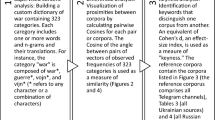Abstract
This paper aims at combining different theoretical and methodological approaches for the analysis of discourse, focusing in particular on argumentative structures. At a first level an attempt is made to include argumentation in critical discourse analysis in order to extend the analysis of interaction between “structures of discourse” and “structures of ideologies” (T. A. van Dijk, R. Wodak and M. Meyer (eds.), Methods of Critical Discourse Analysis. Sage, London, 1995) to higher levels of language description. At a second level the study will integrate the qualitative approaches of critical discourse analysis and argumentation theory with the quantitative tools of corpus linguistics, so that the analysis can be carried out on a representative amount of texts and in a more systematic way. Even though corpus linguistics tends to be focused on meanings localized at the level of words, while argumentative structures stretch out through longer units of text, an integration can be attempted by circumscribing the enquiry to those aspects of argumentation which are signalled by indicators, and are therefore electronically retrievable. In particular, this paper investigates the use of dissociation and presupposition in a corpus of newspaper articles published in the run up to the war on Iraq. Both structures respond to retrievability criteria while being powerful instruments to convey ideologically oriented messages.
Similar content being viewed by others
References
van Dijk, T. A.: 1995, ‘Opinions and Ideologies in Editorials’, Paper 4th Int. Symposium Critical Discourse Analysis, Athens, (http://www.discourses.org)
Dijk T. A. van: 2001, Multidisciplinary CDA: A Plea for Diversity, in R. Wodak, M. Meyer (eds.), Methods of Critical Discourse Analysis, Sage, London
Ducrot, O.: 1972, Dire et ne pas dire, Hermann
Eemeren F. H. van (ed.): 2001, Crucial Concepts in Argumentation Theory, Amsterdam University Press, Amsterdam
Eemeren F. H. van, R. Grootendorst, F. Snoeck Henkemans: 1996, Fundamentals of Argumentation Theory: A Handbook of Historical Backgrounds and Contemporary Developments. Lawrence Erlbaum, Mawhah, NJ
Eemeren F. H. van, R. Grotendorst, A. F. Snoeck Henkemans: 2002, Argumentation: Analysis, Evaluation, Presentation, Lawrence Erlbaum, Mahwah, NJ
Eemeren F. H. van, B. Meuffels, M. Verburg: 2000, The (Un)reasonableness of Ad Hominem Fallacies, Journal of Language and Social Psychology 19(4), 416–435
Fairclough N.: 1995, Media Discourse, Edward Arnold, London
Fairclough N.: 2001 Critical Discourse Analysis as a Method in Social Scientific Research, in R. Wodak, M. Meyer (eds), Methods of Critical Discourse Analysis, Sage, London, pp. 121–138
Garzone G., F. Santulli: 2004, What Can Corpus Linguistic Do for Critical Discourse Analysis?, in A. Partington, J. Morley, L. Haarman. (eds.), Corpora and Discourse, Peter Lang, Bern, pp. 351–368
Halliday, M. A. K.: 1985, 1994, An Introduction to Functional Grammar, 1st and 2nd editions. Edward Arnold, London
Hardt-Mautner G.: 1995, Only Connect. Critical Discourse Analysis and Corpus Linguistics, UCREL, Lancaster
Levinson S. C.: 1983, Pragmatics, Cambridge University Press, Cambridge
Lombardi-Vallauri E.: 2002, La struttura informativa dell’enunciato. La Nuova Italia, Milano
Perelman C., L. Olbrechts-Tyteca: 1958, Traité de l’argumentation. La nouvelle rhetorique. Presses Universitaires de France, Paris
Phillips, M. A.: 1989, ‘Lexical Structure of Text’, Discourse Analysis Monograph 12. English Language Research, Birmingham
van Rees, M. A.: 2002, ‘Argumentative Functions of Dissociation in Every-day Discussions’, in H. V. Hansen, C. W. Tindale, J. A. Blair, R. H. Johnson and C. Pinto (eds.), Argumentation and its Applications, OSSA 2001, CD-rom
Rees M. A. van: 2005, Indicators of Dissociation, in F. H. Eemeren, P. Houtlosser (eds.), Argumentation in Practice, Benjamins, Amsterdam, pp. 53–68
Stalnaker R.: 1973, Presuppositions. Journal of Philosophical Logic 2, 447–457
Stalnaker R.: 2002, Common Ground. Linguistics and Philosophy 25, 701–721
Stubbs M.: 1996, Text and Corpus Linguistics, Blackwell, Oxford
Thompson G., S. Hunston: 2001, Evaluation: An Introduction in S. Hunston G. Thompson (eds.), Evaluation in Text, Oxford University Press, Oxford, pp. 1–27
Widdowson H. G.: 1995, Discourse Analysis: A Critical View, Language and Literature, 4(3), 157–172.=
Wodak R., Meyer M.: 2001, Methods of Critical Discourse Analysis, Sage, London
Author information
Authors and Affiliations
Corresponding author
Rights and permissions
About this article
Cite this article
Degano, C. Dissociation and Presupposition in Discourse: A Corpus Study. Argumentation 21, 361–378 (2007). https://doi.org/10.1007/s10503-007-9058-7
Received:
Accepted:
Published:
Issue Date:
DOI: https://doi.org/10.1007/s10503-007-9058-7




